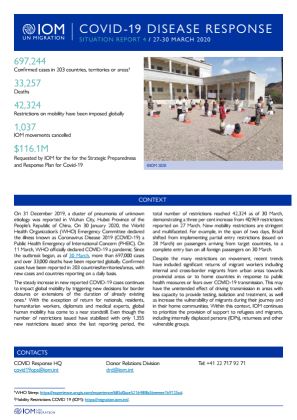-
Countries
-
Data and Analysis
-
Special Focus
-
Crisis Responses
Covid 19 Disease Response - Situation Report 4 (27-30 March 2020)

Contact
COVID Response HQ covid19ops@iom.int
Language
English
Location
Global
Period Covered
Mar 27 2020
Mar 30 2020
Activity
- Other
On 31 December 2019, a cluster of pneumonia of unknown etiology was reported in Wuhan City, Hubei Province of the People’s Republic of China. On 30 January 2020, the World Health Organization’s (WHO) Emergency Committee declared the illness known as Coronavirus Disease 2019 (COVID-19) a Public Health Emergency of International Concern (PHEIC). On 11 March, WHO officially declared COVID-19 a pandemic. Since the outbreak began, as of 30 March, more than 697,000 cases and over 33,000 deaths have been reported globally. Confirmed cases have been reported in 203 countries/territories/areas, with new cases and countries reporting on a daily basis. The steady increase in new reported COVID-19 cases continues to impact global mobility by triggering new decisions for border closures or extensions of the duration of already existing ones.2 With the exception of return for nationals, residents, humanitarian workers, diplomats and medical experts, global human mobility has come to a near standstill. Even though the number of restrictions issued have stabilized with only 1,355 new restrictions issued since the last reporting period, the total number of restrictions reached 42,324 as of 30 March, demonstrating a three per cent increase from 40,969 restrictions reported on 27 March. New mobility restrictions are stringent and multifaceted. For example, in the span of two days, Brazil shifted from implementing partial entry restrictions (issued on 28 March) on passengers arriving from target countries, to a complete entry ban on all foreign passengers on 30 March. Despite the many restrictions on movement, recent trends have included significant returns of migrant workers including internal and cross-border migrants from urban areas towards provincial areas or to home countries in response to public health measures or fears over COVID-19 transmission. This may have the unintended effect of driving transmission in areas with less capacity to provide testing, isolation and treatment, as well as increase the vulnerability of migrants during their journey and in their home communities. Within this context, IOM continues to prioritize the provision of support to refugees and migrants, including internally displaced persons (IDPs), returnees and other vulnerable groups.